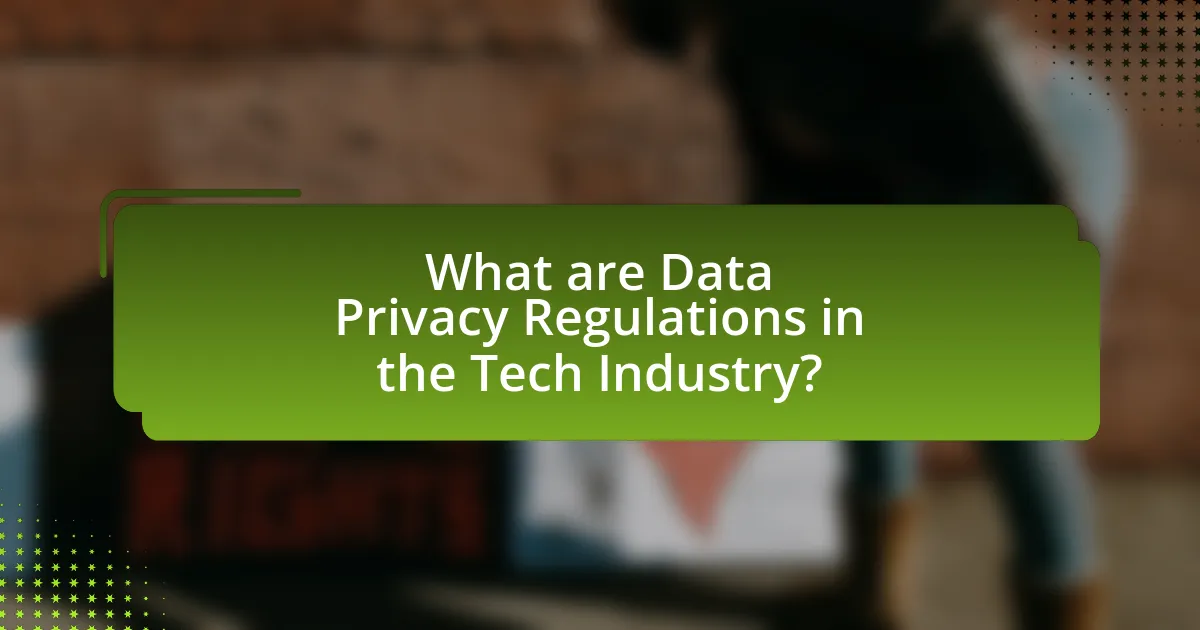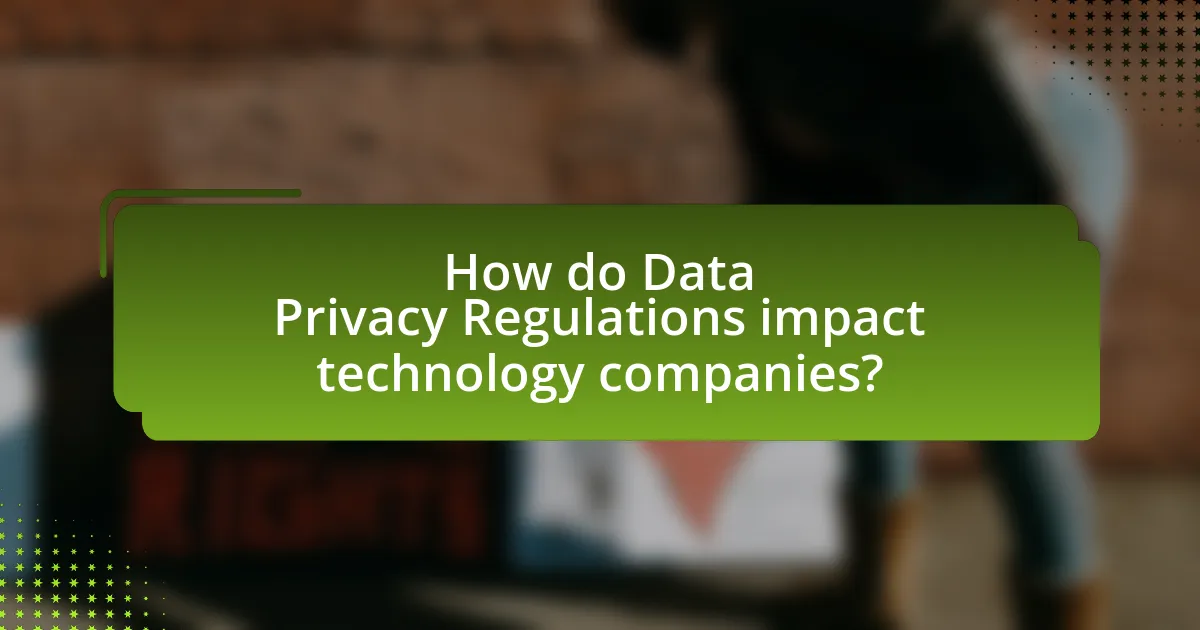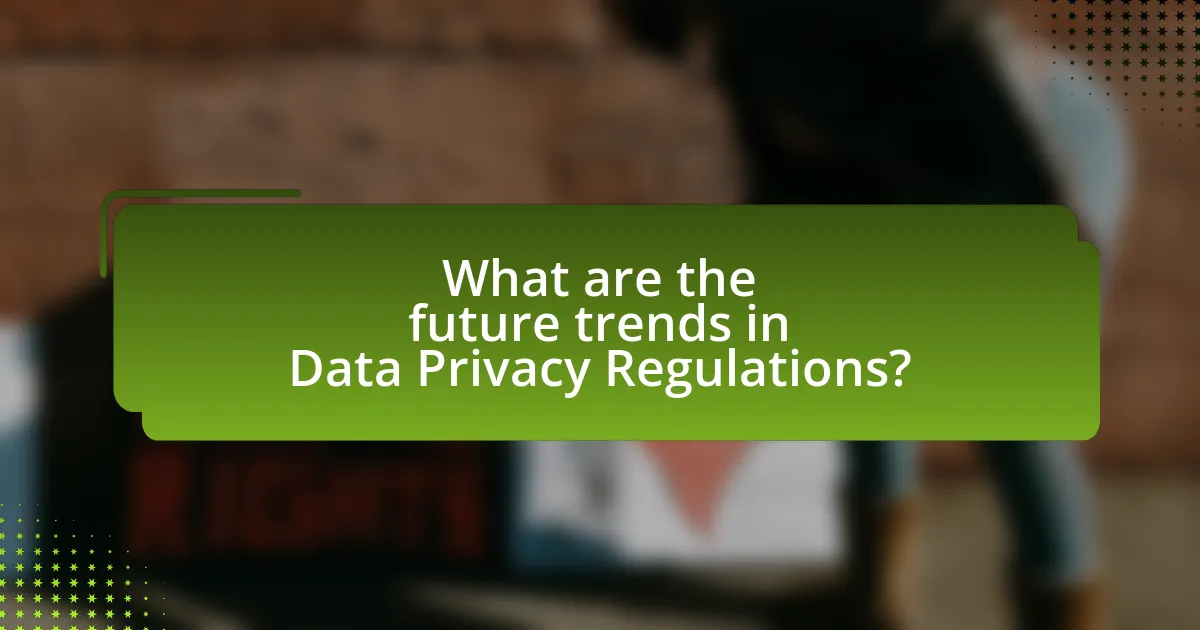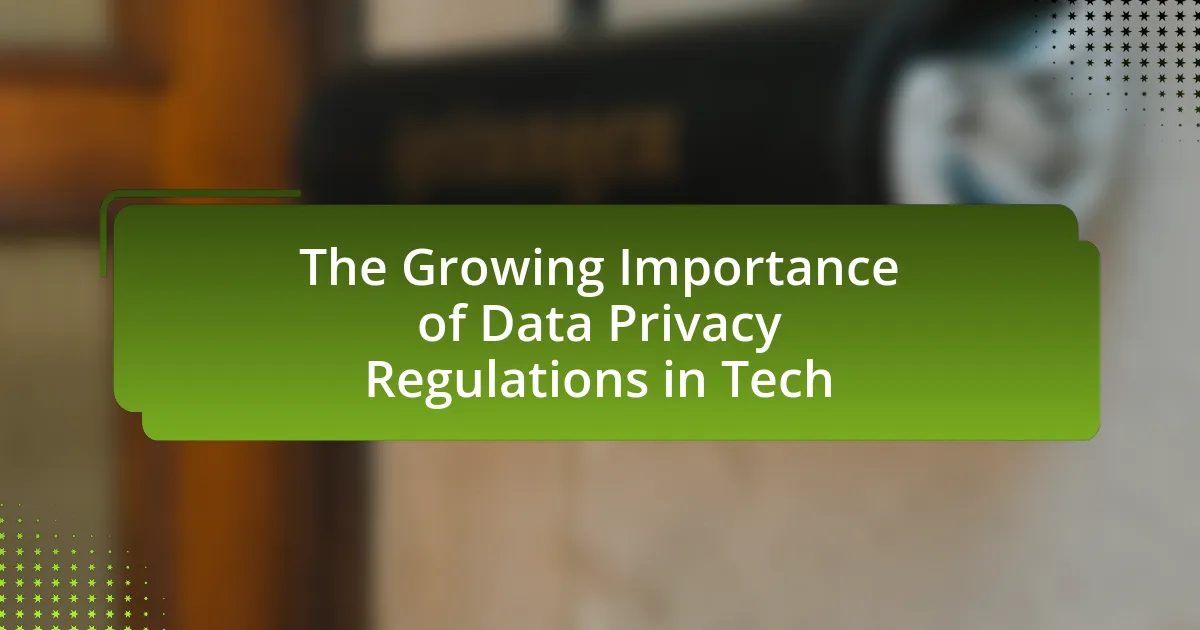Data privacy regulations in the tech industry are essential legal frameworks aimed at protecting personal information handled by technology companies. Key regulations such as the General Data Protection Regulation (GDPR) and the California Consumer Privacy Act (CCPA) establish guidelines for data handling, user consent, and individual rights. The article explores the increasing importance of these regulations due to rising data breaches and consumer concerns, significant events that have triggered their rise, and the impact on technology companies. It also discusses the challenges of compliance, the influence of consumer trust, and future trends in data privacy regulations, emphasizing the need for robust data protection measures in an evolving technological landscape.

What are Data Privacy Regulations in the Tech Industry?
Data privacy regulations in the tech industry are legal frameworks designed to protect personal information collected, processed, and stored by technology companies. These regulations, such as the General Data Protection Regulation (GDPR) in the European Union and the California Consumer Privacy Act (CCPA) in the United States, establish guidelines for data handling, user consent, and individual rights regarding their data. For instance, GDPR mandates that companies must obtain explicit consent from users before processing their personal data and provides individuals with the right to access, rectify, or delete their information. The enforcement of these regulations is crucial, as non-compliance can result in significant fines, exemplified by the €50 million penalty imposed on Google for GDPR violations in 2019.
Why are Data Privacy Regulations becoming increasingly important?
Data privacy regulations are becoming increasingly important due to the rising frequency of data breaches and the growing public concern over personal information security. In 2021, data breaches exposed over 22 billion records globally, highlighting the vulnerabilities in data protection. As technology advances, individuals are more aware of their rights regarding personal data, leading to demands for stricter regulations. The implementation of laws such as the General Data Protection Regulation (GDPR) in Europe has set a precedent, influencing other regions to adopt similar frameworks to safeguard consumer privacy. This trend reflects a broader societal shift towards prioritizing data protection as a fundamental right.
What events have triggered the rise of Data Privacy Regulations?
The rise of Data Privacy Regulations has been triggered by significant events such as the Cambridge Analytica scandal in 2018, which exposed the misuse of personal data from millions of Facebook users without consent. This incident highlighted vulnerabilities in data protection and led to increased public demand for privacy rights. Additionally, the implementation of the General Data Protection Regulation (GDPR) in the European Union in 2018 set a global standard for data privacy, influencing other regions to adopt similar regulations. The growing number of data breaches, such as the Equifax breach in 2017, which compromised sensitive information of approximately 147 million individuals, further underscored the need for robust data protection laws. These events collectively catalyzed a shift towards stricter data privacy regulations worldwide.
How do consumer concerns influence Data Privacy Regulations?
Consumer concerns significantly influence data privacy regulations by prompting lawmakers to enact stricter laws that protect personal information. As public awareness of data breaches and misuse of personal data increases, consumers demand greater transparency and control over their information. This pressure leads to the development of regulations such as the General Data Protection Regulation (GDPR) in Europe, which was largely a response to consumer outcry over privacy violations. Additionally, surveys indicate that a majority of consumers are willing to switch companies if they feel their data is not adequately protected, further motivating regulators to implement comprehensive privacy frameworks.
What are the key components of Data Privacy Regulations?
The key components of Data Privacy Regulations include data protection principles, individual rights, compliance requirements, and enforcement mechanisms. Data protection principles, such as purpose limitation and data minimization, dictate how personal data should be collected and processed. Individual rights, including the right to access, rectify, and erase personal data, empower individuals to control their information. Compliance requirements mandate organizations to implement measures like data protection impact assessments and appoint data protection officers. Enforcement mechanisms, such as penalties and audits, ensure adherence to regulations, with examples like the General Data Protection Regulation (GDPR) imposing fines up to 4% of annual global turnover for non-compliance.
What types of data are protected under these regulations?
Personal data, sensitive data, and health-related data are types of data protected under data privacy regulations. Personal data includes any information that can identify an individual, such as names, addresses, and identification numbers. Sensitive data encompasses information that requires higher protection due to its nature, including racial or ethnic origin, political opinions, and sexual orientation. Health-related data involves any information regarding an individual’s health status, medical history, or treatment, which is often subject to strict regulations like HIPAA in the United States. These classifications are established to ensure individuals’ privacy and security in an increasingly digital world.
How do different regulations vary across regions?
Different regulations vary across regions primarily due to differing legal frameworks, cultural values, and economic priorities. For instance, the European Union’s General Data Protection Regulation (GDPR) emphasizes strict data protection and privacy rights, imposing heavy fines for non-compliance, while the United States adopts a more fragmented approach with sector-specific laws like the California Consumer Privacy Act (CCPA), which focuses on consumer rights but lacks a comprehensive federal standard. Additionally, countries in Asia, such as Japan and South Korea, have their own regulations that blend elements of GDPR with local practices, reflecting their unique societal norms and business environments. These variations illustrate how regional differences in governance and public sentiment shape the landscape of data privacy regulations globally.

How do Data Privacy Regulations impact technology companies?
Data privacy regulations significantly impact technology companies by imposing strict compliance requirements that affect their operations and business models. For instance, regulations like the General Data Protection Regulation (GDPR) in Europe mandate that companies obtain explicit consent from users before collecting personal data, leading to increased operational costs and the need for enhanced data management practices. Additionally, non-compliance can result in hefty fines; under GDPR, companies can face penalties of up to 4% of their annual global revenue. This regulatory landscape compels technology firms to invest in data protection measures, adjust their marketing strategies, and prioritize user privacy, ultimately shaping their competitive positioning in the market.
What challenges do tech companies face in complying with Data Privacy Regulations?
Tech companies face significant challenges in complying with data privacy regulations, primarily due to the complexity and variability of laws across different jurisdictions. For instance, the General Data Protection Regulation (GDPR) in Europe imposes strict requirements on data handling, while the California Consumer Privacy Act (CCPA) introduces different obligations in the United States. These varying regulations create confusion and increase compliance costs, as companies must invest in legal expertise and technology to ensure adherence. Additionally, the rapid pace of technological innovation often outstrips the development of regulatory frameworks, leading to gaps in compliance and enforcement. According to a survey by the International Association of Privacy Professionals, 70% of organizations reported difficulties in understanding and implementing data privacy laws, highlighting the widespread nature of these challenges.
How do compliance costs affect small versus large tech companies?
Compliance costs disproportionately burden small tech companies compared to large tech companies. Small tech firms often lack the financial resources and infrastructure to absorb the high costs associated with compliance, which can include legal fees, technology upgrades, and employee training. For instance, a study by the Small Business Administration found that small businesses spend an average of $12,000 per employee on compliance, while larger firms can spread these costs over a larger workforce, reducing the per-employee expense significantly. Consequently, small tech companies may face challenges in maintaining competitiveness and innovation due to these financial strains, while larger companies can more easily manage and integrate compliance costs into their operational budgets.
What are the potential legal consequences of non-compliance?
Non-compliance with data privacy regulations can lead to significant legal consequences, including hefty fines, legal action, and reputational damage. For instance, under the General Data Protection Regulation (GDPR), organizations can face fines of up to 4% of their annual global turnover or €20 million, whichever is higher, for violations. Additionally, non-compliance may result in lawsuits from affected individuals or groups, leading to further financial liabilities and potential class-action suits. These legal repercussions underscore the critical need for organizations in the tech sector to adhere to data privacy laws to mitigate risks and protect their operations.
How do Data Privacy Regulations influence consumer trust?
Data privacy regulations significantly enhance consumer trust by establishing clear guidelines for how personal information is collected, used, and protected. When companies comply with regulations such as the General Data Protection Regulation (GDPR), they demonstrate a commitment to safeguarding consumer data, which fosters confidence among users. Research indicates that 79% of consumers are more likely to trust companies that are transparent about their data practices, as highlighted in a study by the International Association of Privacy Professionals (IAPP). This trust is crucial for businesses, as higher consumer trust correlates with increased customer loyalty and engagement.
What role does transparency play in building consumer trust?
Transparency is crucial in building consumer trust as it fosters openness and accountability between businesses and their customers. When companies clearly communicate their data practices, including how consumer information is collected, used, and protected, they reduce uncertainty and anxiety among consumers. Research indicates that 81% of consumers feel they have little control over their personal data, and transparency can mitigate this concern by empowering consumers with knowledge. Furthermore, organizations that prioritize transparency are often perceived as more ethical, which enhances their reputation and encourages customer loyalty. For instance, a study by the Pew Research Center found that 79% of consumers are concerned about how their data is used, highlighting the importance of transparent practices in addressing these concerns and ultimately building trust.
How can companies leverage compliance to enhance their brand image?
Companies can leverage compliance with data privacy regulations to enhance their brand image by demonstrating their commitment to protecting customer information. By adhering to regulations such as the General Data Protection Regulation (GDPR) and the California Consumer Privacy Act (CCPA), companies can build trust with consumers, as 79% of customers are more likely to engage with brands that prioritize data privacy. Furthermore, transparent communication about compliance efforts can position a company as a leader in ethical practices, differentiating it from competitors. This proactive approach not only mitigates legal risks but also fosters customer loyalty, ultimately enhancing the overall brand reputation in a market increasingly focused on data security.

What are the future trends in Data Privacy Regulations?
Future trends in data privacy regulations include increased global harmonization, stricter enforcement mechanisms, and a focus on consumer rights. As countries recognize the importance of data protection, initiatives like the European Union’s General Data Protection Regulation (GDPR) have inspired similar laws worldwide, leading to a more unified approach to data privacy. Additionally, regulatory bodies are enhancing their enforcement capabilities, evidenced by significant fines imposed on companies for non-compliance, which serve as a deterrent and encourage adherence to regulations. Furthermore, there is a growing emphasis on empowering consumers with rights such as data access, correction, and deletion, reflecting a shift towards prioritizing individual privacy in the digital landscape.
How are emerging technologies shaping Data Privacy Regulations?
Emerging technologies are significantly shaping data privacy regulations by necessitating more robust frameworks to address new risks associated with data collection and processing. For instance, advancements in artificial intelligence and machine learning have led to increased concerns about data misuse and algorithmic bias, prompting regulators to implement stricter guidelines, such as the General Data Protection Regulation (GDPR) in Europe, which emphasizes user consent and data protection. Additionally, the rise of the Internet of Things (IoT) has introduced complexities in data management, leading to regulations that require transparency in data usage and enhanced security measures to protect consumer information. These developments illustrate how technological innovations drive the evolution of legal standards to safeguard personal data effectively.
What impact do artificial intelligence and machine learning have on data privacy?
Artificial intelligence and machine learning significantly impact data privacy by increasing the potential for data misuse and enhancing surveillance capabilities. These technologies enable the collection and analysis of vast amounts of personal data, often without explicit consent, leading to concerns about unauthorized access and data breaches. For instance, a study by the European Union Agency for Fundamental Rights in 2020 highlighted that AI systems can process personal data in ways that may infringe on privacy rights, emphasizing the need for robust data protection regulations. Additionally, machine learning algorithms can create detailed profiles of individuals, which raises ethical questions regarding consent and transparency in data handling.
How might future regulations adapt to new technological advancements?
Future regulations will likely adapt to new technological advancements by incorporating flexible frameworks that can evolve with emerging technologies. As innovations such as artificial intelligence and blockchain continue to develop, regulatory bodies may implement adaptive policies that allow for real-time updates and modifications. For instance, the General Data Protection Regulation (GDPR) in Europe has already set a precedent by including provisions for technological changes, such as data portability and the right to be forgotten, which reflect the dynamic nature of digital environments. This adaptability is essential to address challenges like data breaches and privacy concerns effectively, ensuring that regulations remain relevant and enforceable in a rapidly changing tech landscape.
What best practices should tech companies adopt for data privacy compliance?
Tech companies should adopt best practices such as implementing robust data encryption, conducting regular privacy audits, and ensuring transparent data collection policies for data privacy compliance. Data encryption protects sensitive information from unauthorized access, while regular privacy audits help identify vulnerabilities and ensure adherence to regulations like GDPR and CCPA. Transparent data collection policies build trust with users by clearly informing them about how their data is used, which is essential for compliance with privacy laws. These practices are supported by the increasing regulatory scrutiny and the need for companies to safeguard user data effectively.
How can companies effectively implement data protection measures?
Companies can effectively implement data protection measures by adopting a comprehensive data governance framework that includes risk assessment, employee training, and the use of encryption technologies. A risk assessment helps identify vulnerabilities and prioritize data protection efforts, while employee training ensures that staff are aware of data privacy regulations and best practices. Additionally, employing encryption technologies protects sensitive data both in transit and at rest, significantly reducing the risk of unauthorized access. According to a report by the Ponemon Institute, organizations that implement a formal data protection strategy can reduce the cost of data breaches by an average of 30%.
What resources are available for staying updated on Data Privacy Regulations?
To stay updated on Data Privacy Regulations, individuals and organizations can utilize several key resources. Government websites, such as the Federal Trade Commission (FTC) in the United States and the European Data Protection Board (EDPB) in the EU, provide official updates and guidelines on regulations. Additionally, legal and compliance firms often publish newsletters and blogs that analyze changes in data privacy laws, such as those from firms like Baker McKenzie and DLA Piper. Industry associations, including the International Association of Privacy Professionals (IAPP), offer training, webinars, and resources tailored to data privacy professionals. Furthermore, academic journals and publications, such as the Journal of Data Protection & Privacy, provide in-depth research and analysis on emerging trends and regulatory changes. These resources collectively ensure that stakeholders remain informed about the evolving landscape of data privacy regulations.



